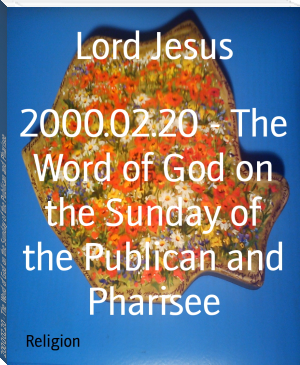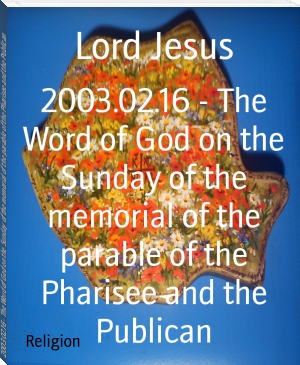The Pharisee and the Publican - John Bunyan (best fiction novels to read .txt) 📗

- Author: John Bunyan
- Performer: -
Book online «The Pharisee and the Publican - John Bunyan (best fiction novels to read .txt) 📗». Author John Bunyan
21; Rom. x. 4.
This done, and concluded on, then turn again, Pharisee, and say thus with thyself—Is it most safe for me to trust in this righteousness of God, this righteousness of God-man, this righteousness of Christ?
Certainly it is; since, by the text, it is counted the best, and that which is best pleaseth God; since it is that which God hath appointed, that sinners shall be justified withal. For “in the Lord have we righteousness” if we believe: and, “in the Lord we are justified, and do glory;” Isa. xlv. 24, 25.
Nay, Pharisee, suppose thine own righteousness should be as long, as broad, as high, as deep, as perfect, as good, even every way as good, as the righteousness of Christ; yet since God has chosen, by Christ, to reconcile us to himself, canst thou attempt to seek by thy own righteousness to reconcile thyself to God, and not attempt (at least) to confront this righteousness of Christ before God; yea, to challenge it by acceptance of thy person contrary to God’s design?
Suppose, that when the king has chosen one to be judge in the land, and has determined that he shall be judge in all cases, and that by his verdict every man’s judgment shall stand; I say, suppose, after this, another should arise, and of his own head resolve to do his own business himself. Now, though he should be every whit as able, yea, and suppose he should do it as justly and righteously too, yet his making of himself a judge, would be an affront to the king, and an act of rebellion, and so a transgression worthy of punishment.
Why, Pharisee, God hath appointed, that by the righteousness of his Son, and by that righteousness only, men shall be justified in his sight from the curse of the law. Wherefore, take heed, and at thy peril, whatever thy righteousness is, confront not the righteousness of Christ therewith. I say, bring it not in, let it not plead for thee at the bar of God, nor do thou plead for that in his court of justice; for thou canst not do this and be innocent. If he trust to his righteousness, he hath sinned, says Ezekiel. Mark the text, “When I shall say to the righteous, that he shall surely live; if he trust to his own righteousness, and commit iniquity, all his righteousness shall not be remembered: but for his iniquity that he hath committed, he shall die for it;” Ezek. xxxiii. 13.
Observe a few things from this text; and they are these that follow.
1. Here is a righteous man; a man with whom we do not hear that the God of heaven finds fault.
2. Here is a promise made to this man, that he shall surely live; but on this condition, that he trust not to his own righteousness.
Whence it is manifest, that the promise of life to this righteous man, is not for the sake of his righteousness, but for the sake of something else; to wit, the righteousness of Christ.
1. Not for the sake of his own righteousness. This is evident, because we are permitted, yea, commanded, to trust in the righteousness that saveth us. The righteousness of God is unto us all, and upon all that believe; that is, trust in it, and trust to it for justification. Now therefore, if thy righteousness, when most perfect, could save thee, thou mightst, yea oughtst, most boldly to trust therein. But since thou art forbidden to trust to it, it is evident it cannot save; nor is it for the sake of that, that the righteous man is saved; Rom. iii. 21, 22.
2. But for the sake of something else, to wit, for the sake of the righteousness of Christ, “Whom God hath set forth to be a propitiation through faith in his blood, to declare his righteousness for the remission of sins that are past, through the forbearance of God; to declare, I say, at this time his righteousness, that he might be just, and the justifier of him that believeth in Jesus;” Rom. iii.
25, 26; see Phil. iii. 6-8.
“If he trust to his own righteousness, and commit iniquity, all his righteousness shall not be remembered; but for his iniquity that he hath committed (in trusting to his own righteousness), he shall die for it.”
Note hence further.
1. That there is more virtue in one sin to destroy, than in all thy righteousness to save thee alive. If he trust, if he trust ever so little, if he do at all trust to his own righteousness, all his righteousness shall be forgotten; and by, and for, and in, the sin that he hath committed, in trusting to it, he shall die.
2. Take notice also, that there are more damnable sins than those that are against the moral law. By which of the ten commandments is trusting to our own righteousness forbidden? Yet it is a sin: it is a sin therefore forbidden by the gospel, and is included, lurketh close in, yea, is the very root of, unbelief itself; “He that believes not shall be damned.” But he that trusteth in his own righteousness doth not believe, neither in the truth, nor sufficiency of the righteousness of Christ to save him, therefore he shall be damned.
But how is it manifest, that he that trusteth to his own righteousness, doth it through a doubt, or unbelief of the truth or sufficiency of the righteousness of Christ?
I answer, because he trusteth to his own. A man will never willingly choose to trust to the worst of helps, when he believes there is a better as near, and to be had as soon, and that too, upon as easy, if not more easy terms. If he that trusteth to his own righteousness for life, did believe that there is indeed such a thing as the righteousness of Christ to justify, and that this righteousness of Christ has in it all-sufficiency to do that blessed work, be sure he would choose that, thereon to lay, lean, and venture his soul, that he saw was the best, and most sufficient to save; especially when he saw also (and see that he must, when he sees the righteousness of Christ), to wit, that that is to be obtained as soon, because as near, and to be had on as easy terms: nay, upon easier than man’s own righteousness. I say, he would sooner choose it, because of the weight of salvation, of the worth of salvation, and of the fearful sorrow that to eternity will overtake him that in this thing shall miscarry. It is for heaven, it is to escape hell, wrath, and damnation, saith the soul; and therefore I will, I must, I dare not but choose that, and that only, that I believe to be the best and most sufficient help in so great a concern as soul-concern is. So then he that trusteth to his own righteousness, does it of unbelief of the sufficiency of the righteousness of Christ to save him.
Wherefore this sin of trusting to his own righteousness is a most high transgression; because it contemneth the righteousness of Christ, which is the only righteousness that is sufficient to save from the curse of the law. It also disalloweth the design of heaven, and the excellency of the mystery of the wisdom of God, in designing this way of salvation for man. What shall I say, It also seeketh to rob God of the honour of the salvation of man. It seeketh to take the crown from the head of Christ, and to set it upon the hypocrite’s head; therefore, no marvel that this one sin be of that weight, virtue, and power, as to sink that man and his righteousness into hell, that leaneth thereon, or trusteth unto it.
But, Pharisee, I need not talk thus unto thee; for thou art not the man that hath that righteousness that God findeth not fault withal; nor is it to be found, but with him that is ordained to be the Saviour of mankind; nor is there any such one besides Jesus, who is called Christ. What madness then has brought thee into the temple, there in an audacious manner to stand and vaunt before God, saying, “God, I thank thee, I am not as other men are?”
Dost thou not know, that he that breaks one, breaks all the commandments of God; and consequently, that he that keeps not all, keeps none at all of the commandments of God? Saith not the scripture the same? “For whosoever shall keep the whole law, and yet offend in one point, he is guilty of all;” Jam. ii. 10. Be confounded then, be confounded.
Dost thou know the God with whom now thou hast to do? He is a God that cannot (as he is just) accept of an half righteousness for a whole; of a lame righteousness for a sound; of a sick righteousness for a well and healthy one; Mal. i. 7, 8. And if so, how should he then accept of that which is no righteousness? I say, how should he accept of that which is none at all, for thine is only such? And if Christ said, “When you have done all, say, We are unprofitable,” how camest thou to say, before thou hadst done one thing well, I am better, more righteous than other men?
Didst thou believe, when thou saidst it, that God knew thy heart?
Hadst thou said this to the Publican, it had been a high and rampant expression; but to say this before God, to the face of God, when he knew that thou wert vile, and a sinner from the womb, and from the conception, spoils all. It was spoken to put a check to thy arrogancy when Christ said, “Ye are they that justify yourselves before men; but God knoweth your hearts;” Luke xvi. 15.
Hast thou taken notice of this, that God judgeth the fruit by the heart from whence it comes? “A good man, out of the good treasure of his heart, bringeth forth that which is good; and an evil man, out of the evil treasure of his heart, bringeth forth that which is evil;”
Luke vi. 45. Nor can it be otherwise concluded, but that thou art an evil man, and so that all thy supposed good is nought but badness; for that thou hast made it to stand in the room of Jesus, and hast dared to commend thyself to the living God thereby: for thou hast trusted in thy shadow of righteousness, and committed iniquity. Thy sin hath melted away thy righteousness, and turned it to nothing but dross; or, if you will, to the early dew, like to which it goeth away, and so can by no means do thee good, when thou shalt stand in need of salvation and eternal life of God.
But, further, thou sayst thou art righteous; but they are but vain words. Knowest thou not that thy zeal, which is the life of thy righteousness, is preposterous in many things? What else means thy madness, and the rage thereof, against men as good as thyself. True, thy being ignorant that they are good, may save thee from the commission of the sin that is unpardonable; but it will never keep thee from spot in God’s sight, but will make both thee and thy righteousness





Comments (0)